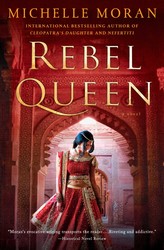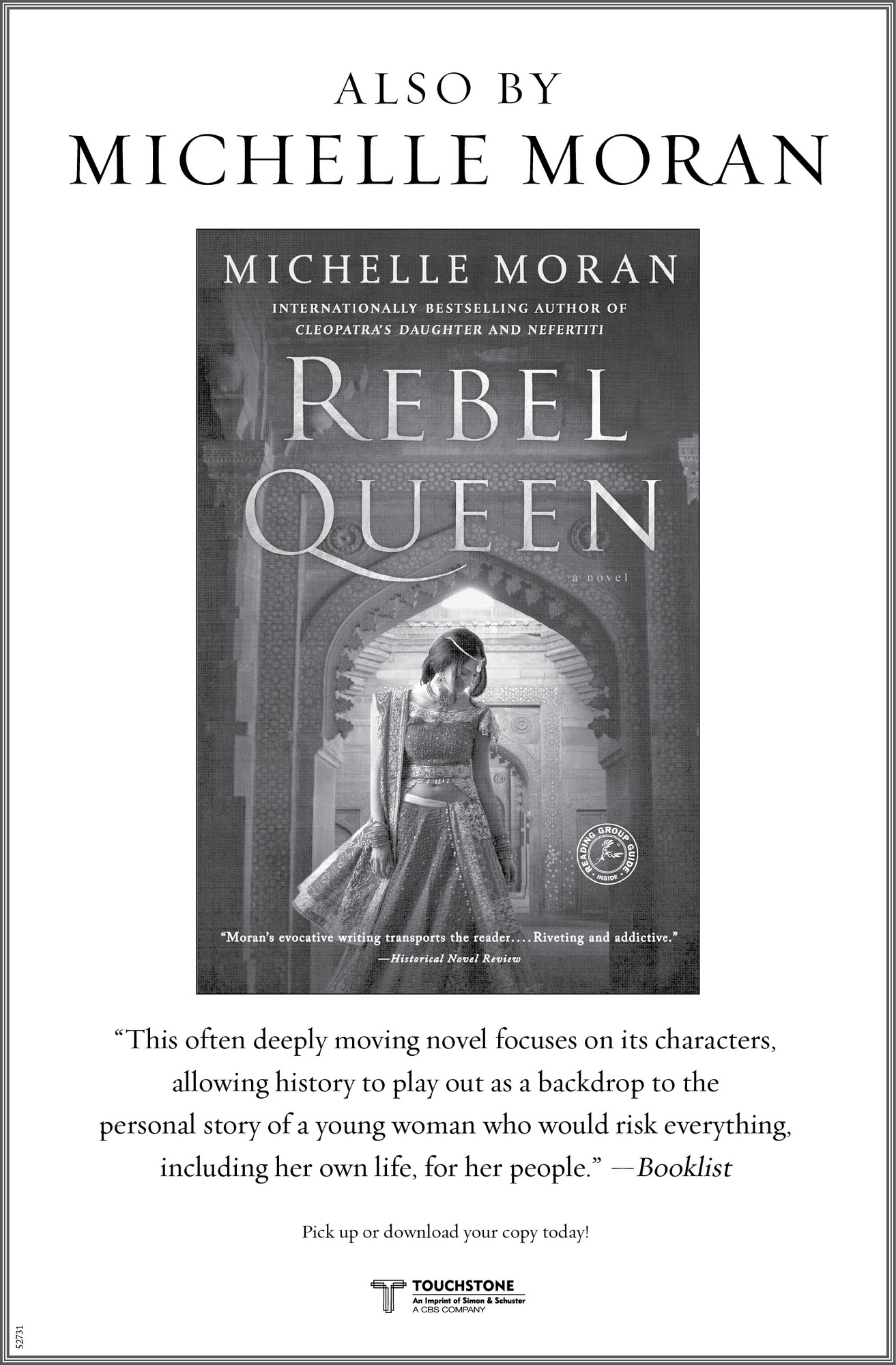Mata Hari's Last Dance (22 page)
Read Mata Hari's Last Dance Online
Authors: Michelle Moran

A Conversation with Michelle Moran
Mata Hari's Last Dance
follows the theme of your other books in that a strong female from history is brought to life. How do you select these women from history for your novels? What inspires you about Mata Hari in particular, and female figures in general?
The women in history who appeal to me the most are often the ones who did something extraordinary, although very little is known about them by the public. In my novel
Rebel Queen
, Sita trained to become one of the queen's personal guards at a time when most women were in purdah and not allowed out of the house. In the case of Mata Hari, I found her rise to fame fascinating. She overcame great personal oddsâthe death of her child, her husband's abuseâto remake herself and become one of the most recognized dancers in Europe.
Why did you choose to begin the novel with Mata Hari's death? Do you think starting with her execution and working backward helps us get close to the truth?
I think when people hear the name
Mata Hari
, a few things immediately come to mind, one of which is her execution. I thought it would
be interesting to start with what people already know and work from there. Mata Hari had an extraordinary life. It was an incredibly complicated one, and the entire truth of what she did (or didn't do) may never be known.
Besides Mata Hari, who is your favorite character in the novel and why?
Her lawyer, Edouard Clunet. He was there throughout her life, even at the very end when she was executed. The fact that he witnessed the entire arc of her career made him an interesting figure.
Do you think Mata Hari was innocent? The story presents us with both possibilities through the newspaper articles. What is your stance? Or do you think the possibility exists that she was both a little guilty and a little innocent?
I think Mata Hari fell prey to all the wonderful press that was written about herâthat she was a great seductress and a stunning beauty. My guess is that she thought she could get away with spying because she was such an irresistible woman. Her entire adult life she'd been told this. So yes, I think she did spy, but I think she did it for France and that she did it very poorly. I don't believe for a moment that she was interested in secrets or war. Money was her goalâit had always been her goal since her father had lost everything when she was a child.
In your research, do you think you discovered the “real” Mata Hari? Or does she remain as mysterious to you as ever?
I think the real Mata Hari is in these pages somewhereâin the glimpses of her childhood, in the pain she describes at seeing her
father living with another woman after he abandoned her family, in the memories of her husband's cruelty. Her personality was forged in the fires of abandonment and abuse. But always, even at the end, she held on to the dream of reuniting with Non.
Discuss the title. In your opinion, is Mata Hari's last dance her death? Or does her legacy reach beyond her execution?
I think her last dance was certainly her death. It was a performance, only this time it was on a political stage and she wasn't able to orchestrate it.
How did you bring to life prewar Paris and Berlin? Did you travel to these cities to capture their spirit? Share with us your research method.
Whenever I write a book, I travel to the locations where my characters spent much of their time. For Mata Hari, that meant going to Paris, Berlin, and the Netherlands. But Paris proved to be the most important, in particular the Musée Guimet, where Mata Hari made her debut.
What do you think was Mata Hari's true goal in life? In some ways, she seems vain. In other moments, she is a heartbroken mother. What is your take on the real person's desire?
I think she was many things, just as all of us are. She was beautiful and vain and ambitious and wounded. She was a wife and mother and dancer and courtesan. She searched desperately for love and couldn't seem to recognize the real form of it when it came. I think that the biggest mistakes she made in her life (in terms of what she
did during the war and the men she allowed to court her) go back to this desperate search for acceptance.
Do you understand Mata Hari's popularity as a form of exoticism? Is this problematic for you? How did you tackle such a large issue in the novel?
This is such a great question. There's no doubt that Mata Hari's success came from her perceived exoticism. This is something she tried very hard to cultivate, going as far as changing her name and place of birth whenever she spoke with the press. We know she fell in love with Hinduism at some point in Java, but whether she practiced it at home is highly doubtful. She probably embraced it much the same way her audiences didâas something new and interesting. However, when you really look at her dances and how they incorporated Hindu gods, what she was doing was shocking. Nothing like that was happening in any temple in India or Java. I'm sure she knew that and I'm sure it didn't concern her. She was an entertainer.
You ask “what is truth and what is propaganda?” in the novel (page 167). Can you answer your own question in light of Mata Hari's arrest and conviction?
That's a difficult question when writing about Mata Hari. She tried so hard to obfuscate her past that in some ways she really succeeded. In terms of her death, though, I have very strong feelings that it served both France and Germany's need at the time. I talk about this in my epilogue. It's a sad thing to realize just how grossly justice was miscarried in her case.
Is there a historical moment of interest to you right now? What are you reading?
Yes! Ancient Egypt. Every few years I feel the need to return to the world of the Pharaohs, now more than ever. Currently I'm reading a book about life under Pharaoh Hatshepsut. She was a fascinating woman who reigned as a king long before Nefertiti and Cleopatra.
Enhance Your Book Club
1. Part of the appeal of
Mata Hari's Last Dance
is the fact that Mata Hari is not just a fictional character in a novel but was a real woman tried and convicted of treason during World War I. Host a movie night with your book club and watch the 1931 film
Mata Hari
. After the movie, discuss her life as it was presented in the film and in the novel. What conclusions can you draw about her? Is she a sympathetic figure? In the end, do you believe she was innocent and simply out of touch with the reality of the war?
2. Mata Hari has the great fortuneâand perhaps misfortuneâto travel widely throughout Europe during the height of her fame. Travel goes hand-in-hand with Mata Hari's desire for transformation, her wish to lose her “real” self in furs and fancy apartments, or undressed and dancing. With your group, look at photographs of Mata Hari's two favorite citiesâParis and ÂBerlin. Imagine what it was like to live in these glamorous places before the war. Over dinner, share with your book club a place you have been that changed your life. Share photos and memories about this special place. Do you feel like Mata Hariâexotic, newâwhen you travel?
3. Just before her execution, Mata Hari talks to Bowtie one last time. When he asks her what she wants to discuss she says
“poppies”
âa topic inspired by a poem she had recently read and perhaps also from her belief in herself as an “orchid among buttercups.” Return to page
247
and reread the poem with your book club. What images does the poem bring to mind? What feeling did you get hearing the poem? Why do you think Mata Hari had this poem on her mind right before her death? Try writing your own poem inspired by “In Flanders Fields.” Make the first line of your poem “In ______ the _____ grow.” Share your poem with your group.
4. Michelle Moran has written several other historical novels. Chose another era to go back in time with Moran, such as the one depicted in
Rebel Queen
or
Nefertiti
. Compare the strong female characters in all of Moran's novels. Do these characters share common traits? What are they? How do you think this author breaks stereotypes for women across the ages?
Meet Queen Lakshmi, another powerful woman brought to life Michelle Moran!
In the tradition of her bestselling novel,
Nefertiti
, and through her strong, independent heroines fighting to make their way in a male dominated world, Michelle Moran brings nineteenth-century India to rich, vibrant life.

Rebel Queen
ORDER YOUR COPY TODAY!

About the Author
M
ichelle Moran was born in Southern California. After attending Pomona College, she earned a master's degree from Claremont ÂGraduate University. During her six years as a public high school teacher, Moran used her summers to travel around the world, and it was her experiences as a volunteer on archaeological digs that inspired her to write historical fiction. She is the internationally bestselling author of the novels
Rebel Queen, Nefertiti
,
The Heretic Queen
,
Cleopatra's Daughter
,
Madame Tussaud
,
and
The Second Empress
,
which have been translated into more than twenty languages. Visit her online at
MichelleMoran.com
.
MEET THE AUTHORS, WATCH VIDEOS AND MORE AT
authors.simonandschuster.com/Michelle-Moran
 Â Facebook.com/TouchstoneBooks
 Facebook.com/TouchstoneBooks
   Twitter.com/TouchstoneBooks
 Twitter.com/TouchstoneBooks
Also by Michelle Moran
Rebel Queen
The Second Empress
Madame Tussaud
Cleopatra's Daughter
The Heretic Queen
Nefertiti
